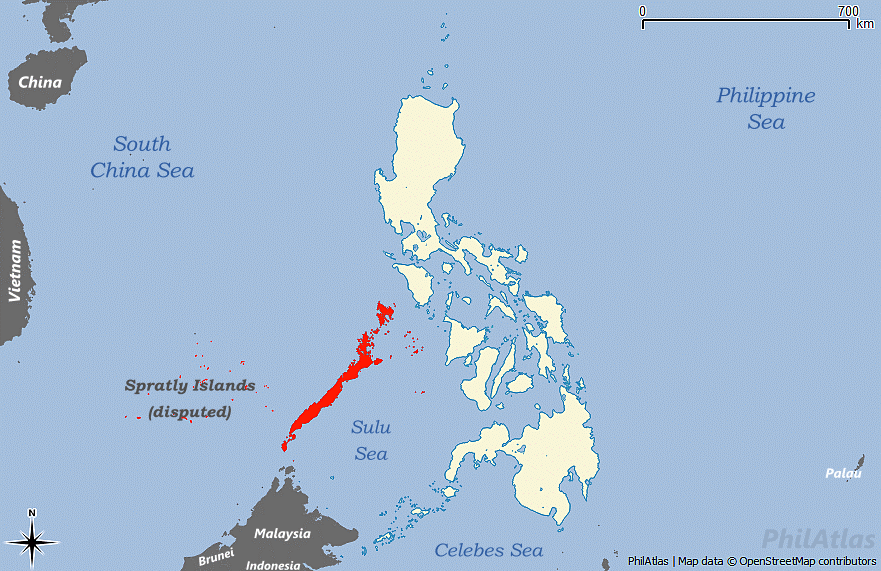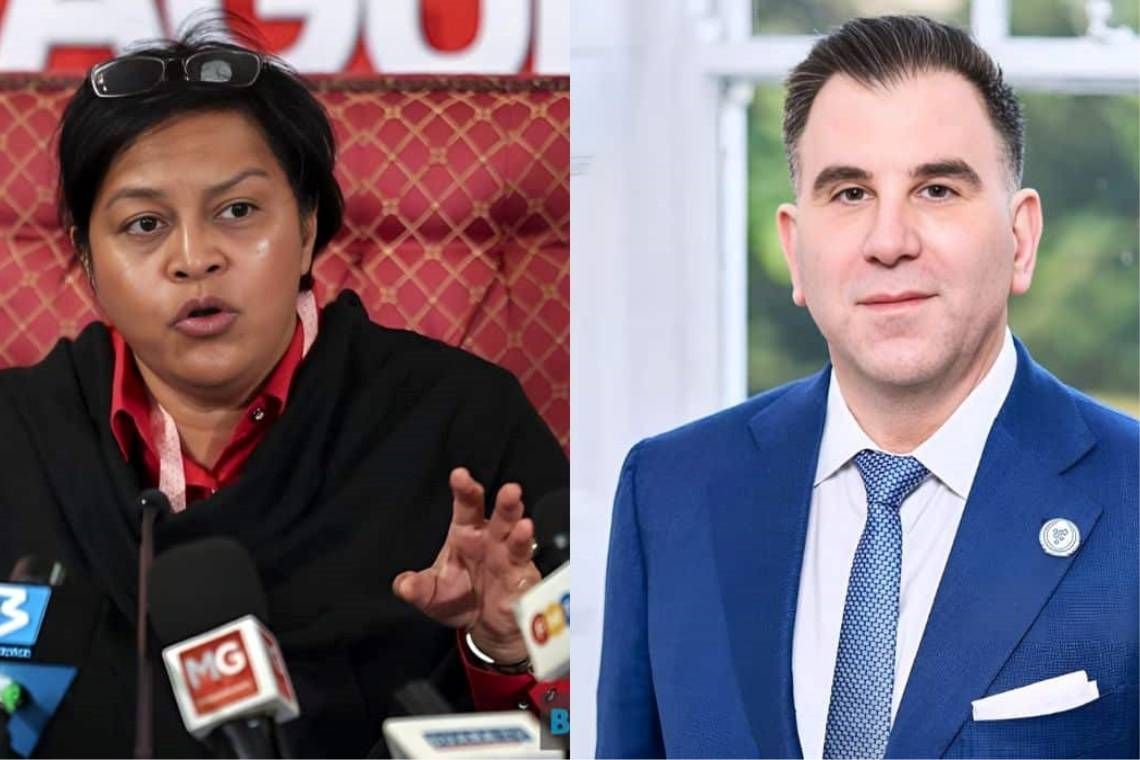Azalina Othman Said, senior Malaysian ministerial representative on the Sabah Arbitration, and Paul Cohen, lead lawyer for the Sulu claimants. Image Source: Confilegal
As a French court deliberates the high-stakes legal battle over Malaysia’s Sabah state, past remarks by the Sulu claimants’ lead lawyer, including the suggestion that the territory could be leased to another country—take on renewed significance as observers weigh what could follow.
The Paris Court of Appeal heard the case on July 7 brought by the supposed heirs to the defunct Sulu Sultanate. The claimants, whose status as heirs is also disputed by descendants of the Sulu household, argue they are owed compensation under an 1878 agreement with British colonial authorities.
The claimants have taken their case to international arbitration venues in Europe, prompting a sharp response from Malaysia, which views Sabah as an integral and undisputed part of its territory after public opinion in the state favored membership in the Malaysian Federation in 1963.
But it is not just the legal battle that is raising eyebrows. In public remarks, Paul Cohen, the lawyer representing the Sulu claimants, suggested the supposed heirs might consider leasing Sabah to the Philippines or China.
This treatment of Sabah and its population as a historical property rests on the argument that by refusing to hand over nearly $15 billion in national assets to the unverified claimants to the Sultanate, Malaysia nullified the original handover of Sabah in 1878.
The lawyer representing the Sulu claimants, suggested the group might consider leasing Sabah to the Philippines or China
Though widely dismissed as legally implausible and diplomatically provocative, the idea has alarmed observers. The comments underscore how politically unorthodox and unpredictable the claimants’ strategy could become, especially if court decisions continue to go against them.
Adding to concerns is the financial stake of Paul Cohen’s company Therium, the litigation funder backing the case. The firm has reportedly spent more than US $20 million on legal and arbitration efforts since 2017, with signs of financial distress in 2025 followed by its acquisition by Fortress Investment Group.
Therium has reportedly spent more than US $20 million on legal and arbitration efforts since 2017, with signs of financial distress in 2025.
If even a fraction of the original multi-billion-dollar arbitration award were ever recovered, Therium could stand to gain substantially—raising questions about whether the funder might encourage more aggressive or geopolitically charged tactics in hopes of salvaging its investment.
Can it even be done?
There is no recognized legal mechanism that would allow a group of private individuals—all eight Sulu claimants have no part in the government of the Philippines or the province of Sabah— to lease or transfer a territory administered by another sovereign state.
Any such move would violate international law, challenge the authority of the United Nations Charter, and almost certainly trigger diplomatic outrage—not just from Malaysia, but from other countries wary of such precedents and vulnerable to claims on their own territories. Even so, the suggestion reveals the potential for the Sabah issue to be manipulated far beyond its original legal contours even if only as leverage for financial gain.
The suggestion reveals the potential for the Sabah issue to be manipulated far beyond its original legal contours even if only as leverage for financial gain.
For Malaysia, the dispute presents more than a legal irritation. If it continues to escalate, Kuala Lumpur could be forced to ‘internationalize’ the issue—pushing it onto the agendas of multilateral organizations or involving diplomatic partners.
That could mean issuing formal protests at the United Nations, raising the matter within ASEAN forums, or even seeking an advisory opinion from the International Court of Justice. Any of these steps would represent a shift in tone, signaling that Malaysia sees the dispute not merely as a legal nuisance, but as a significant challenge to regional stability.
✉ Get the latest from KnowSulu
Updated headlines for free, straight to your inbox—no noise, just facts.
We collect your email only to send you updates. No third-party access. Ever. Your privacy matters. Read our Privacy Policy for full details.
What is Manila’s stance?
For the Philippines, the implications are more complex. While Manila officially distances itself from the arbitration proceedings, the Sabah claim remains a politically sensitive issue at home. While rare, nationalist lawmakers and minor segments of the public periodically lodge controversial requests for the government to reassert claims over Sabah, putting pressure on sitting presidents to act—even if only symbolically.
While Manila officially distances itself from the arbitration proceedings, the Sabah claim remains a politically sensitive issue at home.
A clear and decisive ruling against the Sulu heirs would provide welcome relief for the Marcos administration. It would allow Manila to point to a final legal resolution as justification for maintaining its current hands-off approach. Without the heirs’ case gaining traction, the government would be better positioned to resist domestic calls to revive the territorial claim, particularly during election cycles or periods of heightened nationalism.
In that sense, the dispute's resolution could defuse a long-standing political headache, allowing the Philippines to focus on more immediate priorities, such as maritime security in the South China Sea, post-pandemic economic recovery, and administrative reform critical to improving representation for Mindanao and the Sulu people.
The dispute's resolution could defuse a long-standing political headache, allowing the Philippines to focus on more immediate priorities.
However, if ambiguity persists—whether through unresolved court rulings or new maneuvers by the claimants—nationalist voices in Manila may seize on the uncertainty. Lawmakers like Rufus Rodriguez have already called on the Philippine government to revisit its dormant claim over Sabah, following Malaysia’s formal objections to the country’s newly enacted maritime legislation.
But tensions are not flowing in just one direction. In a reversal of roles, a Malaysian historian has recently argued that Palawan — the westernmost and largest Philippine province — should form part of Malaysia. Remy Majangkim, writing in the Jesselton Times, cited colonial-era documents and an 1885 clarification by the Sultan of Brunei that he claims placed Palawan under the British North Borneo Chartered Company. That interpretation contradicts the historical consensus that Palawan was ceded to Spain and later came under American and Philippine sovereignty.
A Malaysian historian has recently argued that Palawan — the westernmost and largest Philippine province — should form part of Malaysia.
Though these calls have not translated into formal policy, they illustrate how quickly the Sabah issue can escalate the conversation in Southeast Asia.

Claims toward Palawan, the largest and westernmost province of the Philippines, are emblematic of the wider consequences of the Sabah dispute. Image Source: PhilAtlas
Potential involvement of other governments
Further complicating matters is Cohen’s call for the involvement of external powers such as China. While China has not publicly commented on the Sabah dispute, any expansion of the dispute to additional countries could upend regional dynamics.
Indeed, the claimants’ strategy, by drawing in outside actors, risks introducing additional complexity to an already sensitive geopolitical environment involving no less than four ASEAN countries in relation to broader maritime disputes in the South China Sea.
So far, ASEAN has largely avoided taking a public position. The bloc’s longstanding principle of non-interference makes it reluctant to wade into disputes between member states. But should the Sulu claimants succeed in the Paris Court of Appeal and perpetuate the dispute, ASEAN may be forced to respond to an issue that governments in Malaysia, the Philippines, and Indonesia settled long ago—especially if the Sabah claim begins to interfere with regional maritime boundaries. The revival of the dispute could test the limits of its cohesion and jeopardize the significant progress in regional cooperation.
The revival of the dispute could test the limits of its cohesion and jeopardize the significant progress in regional cooperation.
While we wait
Kuala Lumpur has maintained a firm stance on sovereignty and the right of Sabahans to self-determination, with Malaysian officials emphasizing that Sabah's status is not up for negotiation. At the same time, there is awareness of the diplomatic cost an escalated dispute could bring. A public clash with the Philippines risks straining bilateral cooperation on security, trade, and significant labor migration—areas where both countries have strong mutual interests.
But as the supposed heirs pursue increasingly unconventional strategies and nationalist voices stir on both sides of the Sulu Sea, the potential for geopolitical escalation is a worrying prospect.
The revival of competing historical narratives on both sides has already underscored the broader risks tied to the Sabah dispute—tensions that regional leaders would doubtless prefer to avoid.
The decision in Paris could take weeks or even months, and while Malaysians, Filipinos, and legal observers across the world wait, what happens next may not only determine the outcome of a single legal claim—it could jolt relations in Southeast Asia into an uncertain future.
REFERENCES
Andres, L. (2024, November 13). Heirs now free to lease Sabah to China, Philippines, says lawyer. New Straits Times. https://www.nst.com.my
Bloomberg Law. (2025, April 22). Litigation funder Therium conducts layoffs amid upcoming shift. Bloomberg Law. https://news.bloomberglaw.com/
De la Cruz, J. M. N. (2024, November 18). Lawmaker: Malaysia’s protest over maritime laws baseless. BusinessMirror. Retrieved July 8, 2025, from https://businessmirror.com.ph/
Government of Malaysia. (n.d.). Timeline of key events in the Sulu case. Malaysia–Sulu Case Official Website. https://www.malaysia-sulucase.gov.my/
Jesselton Times. (2025, April 6). Could Malaysia assert claims over Palawan, Balabac, and Cagayan Island in the Philippines? https://jesseltontimes.com/
Law Society Gazette. (2024, January 5). Arbitrator in $14.9bn case jailed following intervention by Malaysia. Law Society Gazette. https://www.lawgazette.co.uk/
Nardell, G. (2024, February 3). Carry on regardless? The Sulu case, arbitrator authority and principles of recognition. Kluwer Arbitration Blog. https://arbitrationblog.kluwerarbitration.com/
Rappler. (2022, July 13). Malaysian assets at risk globally as late Sulu sultan heirs claim award. Rappler. https://www.rappler.com/
Straits Times. (2023, June 27). Dutch court rules sultan’s heirs cannot seize Malaysian assets. The Straits Times. https://www.straitstimes.com/
The Edge Malaysia. (2023, March 28). Malaysia succeeds in bid to annul Sulu arbitration award in Paris Court of Appeal. The Edge Malaysia.
The Lawyer. (2025, June 10). Therium hands off case portfolio to Fortress in major shift. The Lawyer. https://www.thelawyer.com/



